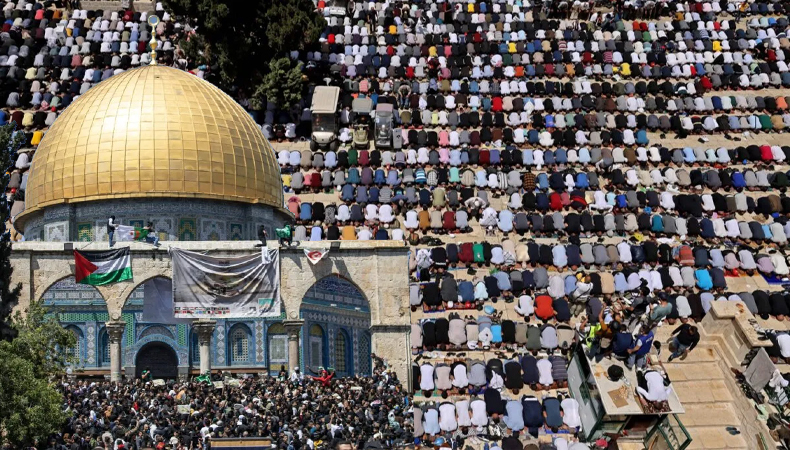At Al-Aqsa, 2,50,000 people offer the final Friday Ramadan prayers

Up to 250,000 Palestinian Muslims gathered at Al-Aqsa Mosque for the fourth and likely final Friday prayer of Ramadan, surrounded by a sizable Israeli security presence.
On the roads leading to the mosque, more than 3,200 police, border police, and Shin Bet security personnel were stationed.
Authorities permitted non-permitted entry into Jerusalem from the West Bank for Friday prayers for women of all ages, men over 55, and young children under 12.
Many Palestinians only get the chance to travel to Jerusalem during Ramadan and pray at Al-Aqsa. Many people had never been to the city before.
The fourth Friday prayer of Ramadan will be offered in Al-Aqsa Mosque, said Ramallah resident Ahmed Khassib, 51, to Arab News.I wait all year for this opportunity because I can only get a permit to pray at Al-Aqsa Mosque on Fridays during Ramadan.
Read | Tunisian footballer dies after setting himself on fire in protest
Khasib claimed that praying in the mosque “carries a message that Al-Aqsa is for Muslims.” Sheikh Ekrimeh Sabri, the imam of Al-Aqsa Mosque, addressed the congregation during his Friday sermon and said, “You who came to the blessed Al-Aqsa Mosque from all parts of holy Palestine, you who have crossed the unjust military checkpoints, your march to the blessed Aqsa for the evening prayer and Taraweeh prayers is to remind the 2 billion Muslims of the world of the captive Al-Aqsa.”
Palestinian from the Gaza Strip who now resides in Ramallah, Abd Al-Salam Abu Askar, told Arab News that the far-right Israeli National Security Minister Itamar Ben-Gvir’s divisive remarks regarding Al-Aqsa have emboldened Palestinians to resist Israeli limitations on their freedom to pray there.
He claimed that during Ramadan, particularly on Fridays, they flocked to the mosque whenever they believed it was in danger.
Today, there would be more than 500,000 worshipers at Al-Aqsa if all West Bank and Gaza Strip residents were permitted to enter through the military checkpoints that surround the city of Jerusalem, according to Abu Askar.




